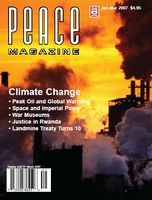
Peace Magazine Jan-Mar 2007, page 6. Some rights reserved.
Search for other articles by Adam Elkus here
With the stroke of a pen, President Bush has declared outer space a US colony
On October 18, President George W. Bush signed an executive order creating a new national policy which proclaims that the US will brook no restraint of any kind on its "rights, capabilities, and freedom of action" in space, and that it has the right to deny space "access" to any power deemed hostile to US "national interests." The report did not elaborate on how the US would restrict this access, but Air Force officers have written position papers calling for an "active military posture" in space that may include "deception, disruption, denial, degradation and destruction" by "hunter-killer microsatellites" and "spaced-based weapons platform [s]" such as advanced lasers and "100kg tungsten bolts." Essentially, Bush has declared outer space an American colony with the stroke of a pen.
In the delusional world of the President and his advisors, America is not just a superpower but an imperial state without precedent. In their study The Nation-State and the Global Order, historians Walter C. Opello, Jr., and Stephen J. Rosow define a traditional empire as essentially borderless:
A traditional empire was, theoretically, expandable to encompass the entire globe because empires did not have fixed borders. Imperial borders were merely frontiers that marked the empire's temporary outer limits where its army happens to have stopped and could be moved outward at will. In other words the boundaries of a traditional empire did not demarcate an area of exclusive territorial jurisdiction based on a shared national identity, but defined a flexible zone of military and economic contact between the empire and the peoples outside of it.
The "zone of contact" provides a useful framework for evaluating a traditional empire. During the early years of the Bush administration, America did fit such a paradigm. Bush gave himself the right to use unilateral and preemptive force to "pursue" nations that "harbor or support terrorism." He also committed to using force to spread "liberty and prosperity" -- capitalist democracy.
Although those steps seemed radical at the time, they weren't. Subverting and directly overthrowing governments is a policy that precedes the Bush administration. The United States did not ask for the approval of anyone when it invaded Mexico to catch Pancho Villa, considered as much of a terrorist at the time as Bin Laden and cohorts are now. The 700 bases in 130 countries that the United States maintains were not all constructed after 2000.
A traditional empire's reach is limited by where its soldiers can march. Yet to the President, the reach of the Empire is limitless. The 2001 Afghanistan war was not originally called "Infinite Justice" for nothing. Now Bush claims custody of outer space itself -- custody of everything outside of the Earth.
It is not enough for the United States to have the most powerful military force in the world, control the world economy through the IMF, World Bank, and WTO, and maintain a hegemony that rivals that of Rome and Victorian England. The soldiers of the Empire must march across heaven itself. When a White House staffer declared that "We're an empire now, and when we act, we create our own reality," he was not boasting but expressing an official administration position.
Yet the United States' hegemony is fast eroding. The debacles in Iraq and Afghanistan have reduced American influence. The economy is burdened by trade deficits that in a decade could total 50 percent of GDP. The US military is stretched to the breaking point. North Korea's testing of nuclear arms is an ominous foreboding of a future in which thirty new states may gain nuclear capabilities.
Bush's new space policy is almost explicitly aimed at the Chinese. What other power "hostile" to American "national interests" has the capability to go into space? The Pentagon fears that its military satellites could one day be knocked out.
But ostentatious muscle-flexing will not solve the problem. Last October, the United States vetoed a resolution calling for the banning of weapons in space, rejecting the opportunity to turn space into a demilitarized zone and setting the stage for an arms race.
China has committed itself to developing technologies to blind America's all-seeing eyes. And it has made remarkable progress. The Pentagon reported in early October that China had tested its anti-satellite laser and jammed a US satellite. Saber-rattling by the US, and fantastic declarations of control over space itself, will neither stop China's rise nor make America more secure.
Adam Elkus is a freelance writer living in Pacific Palisades, California.
Peace Magazine Jan-Mar 2007, page 6. Some rights reserved.
Search for other articles by Adam Elkus here